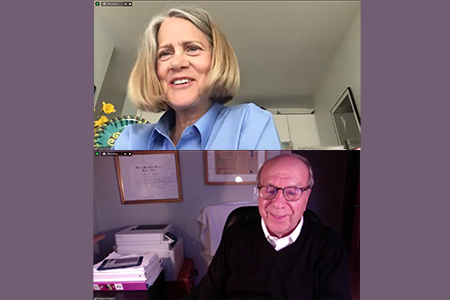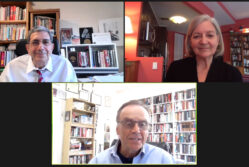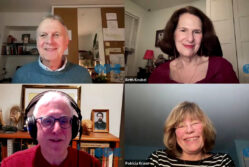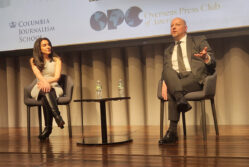Event Coverage Highlight

Stephen Shepard Reflects on ‘Second Thoughts’ and News Industry Challenges

by Chad Bouchard
Journalism in the digital age has increased demands on reporters, fueled attacks on their integrity, and imploded traditional media business models, leaving news organizations scrambling for sustainable revenue, author and journalist Stephen B. Shepard said during an OPC book night on April 1.
Despite discouraging trends, the former editor-in-chief of BusinessWeek said he sees reason for optimism and hope in the next generation of journalists.
Shepard’s book, Second Thoughts: On Family, Friendship, Faith and Writers, is a reflection on his life, including his childhood in the Bronx, his struggles with his Jewish identity, his career at Newsweek and BusinessWeek, and his years as founding dean of the Graduate School of Journalism at the City University of New York.
OPC President Paula Dwyer asked Shepard about some of the fears and anxieties he noted in the book, including his fear of success and his struggle to embrace his passion, journalism, over engineering, his chosen major.
“It had a lot to do with guilty feelings about outdoing my father, who wasn’t particularly successful financially in his work. So that ambition was not a good thing for me and pursuing the goal of being a journalist was not a good thing. It filled me with a lot of guilt.”
Shepard graduated from the City College of New York and earned a master’s degree from Columbia University, both in engineering. He said engineering was the “easy way out” for him because he didn’t care about it as much as journalism.
He said he grew up with conflicting identities — his Jewish heritage versus his family’s desire to assimilate into American culture. Shepard said while he had a Jewish education and a bar mitzvah at an Orthodox Jewish synagogue, reading contemporary Jewish authors such as Saul Bellow, Philip Roth, Bernard Malamud, Cynthia Ozick and Isaac Bashevis Singer helped him to shift his perspective on his own “Jewishness.”
“They didn’t often write about Jews as religious practitioners, they mostly wrote about Jews in the process of assimilating in the larger context of America,” Shepard said. “And in effect, they gave people like me, who were inclined this way to begin with, permission to be secular Jews and not particularly religious Jews.”
In Shepard’s early years in journalism, he covered Ralph Nader’s work on automotive safety for a design magazine called Product Engineering, in which he wrote about General Motors’ surveillance of the consumer activist and the congressional hearings that followed. He was soon hired at BusinessWeek, where one of his first assignments was a cover story on the auto industry’s response to safety issues. He later turned his focus to environmental reporting and became environment editor at BusinessWeek, he said.
As founding dean of the CUNY Graduate School of Journalism, he developed a three-semester program that included a paid summer internship session, partly as an answer to the need for journalists to learn more digital skills in addition to “the eternal verities of journalism, the reporting and the writing, the ethical traditions, the analytical skills that you needed to do journalism.”
“It was so exciting, however hard it was it didn’t feel daunting to me, it felt like I had a mission to do this, that it was important to me to start a graduate school of journalism at a place like the City University of New York, which was a public alternative to Columbia, and to some extent NYU, in the media capital of the world,” he said.
Shepard expressed concern about the sustainability of the journalism industry and flagging faith in the news media. He cited Gallup poll numbers indicating that trust in news media peaked around 72 percent following the Watergate scandal of the early 1970s, and has been declining ever since, down to about 32 percent now.
He said while his research did not support the notion of political bias in the media, he did see evidence that many journalists are “coastal snobs” who don’t care about Middle America and regions far from metropolitan centers.
Newspapers in coastal U.S. cities cover elite niche sports like lacrosse but not stock car racing, which is embraced by millions of people, Shepard said. Traditional media also failed to adequately cover the effects of the opioid crisis in small cities and rural communities, and tend to cover elite universities while ignoring community colleges that account for half of the undergraduate student population in the U.S.
“And that is one of the reasons why the press missed the story about Donald Trump, why they were so wrong in the election of 2016,” Shepard said. “They didn’t understand what his appeal was. They didn’t understand that many people of Middle America were hurting very badly and were upset about technological change and globalization and immigration.”
He said he’s concerned that the news industry still hasn’t found an adequate business model to sustain quality journalism, adding that newspapers have shed more than half of their jobs over the last decade, while platforms like Google and Facebook are taking 80 percent of the digital advertising revenue.
Dwyer asked Shepard whether he is encouraged or discouraged about the future of journalism overall.
“In Middle America there’s been a serious decline in local reporting, and that’s very discouraging and raises all kinds of questions about democracy and the political system, and how we keep people informed with quality information.”
He said he sees signs of hope as journalism students from CUNY and other schools are able to get good jobs and do good work. He said organizations like Report for America, which has sent 1,000 journalists to newsrooms across the country to cover local news, and nonprofit news groups like ProPublica that partner with local papers, are also positive signs.
Dwyer quoted from Shepard’s book about the inspiration for the title of his book, the idea of “second thoughts” as a reflection on experience: “Second thoughts often manifest themselves as questions. They don’t necessarily have answers, but the questions themselves frequently raise doubts, regrets, or missed opportunities.”
Shepard said “second thoughts” are not necessarily bad, they are an introspection on life and whether your feelings have changed based on experience.
“Second thoughts are very profound in a lot of ways. We are able to gain insights that we didn’t have as younger people, and on our best days we have something approaching wisdom,” he said. “When I look back, I just consider myself extraordinarily luck, both personally and professionally.”
Click the window below to watch a playlist of video clips from the program.



